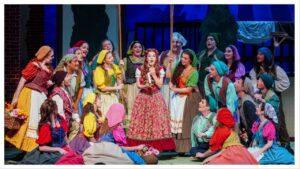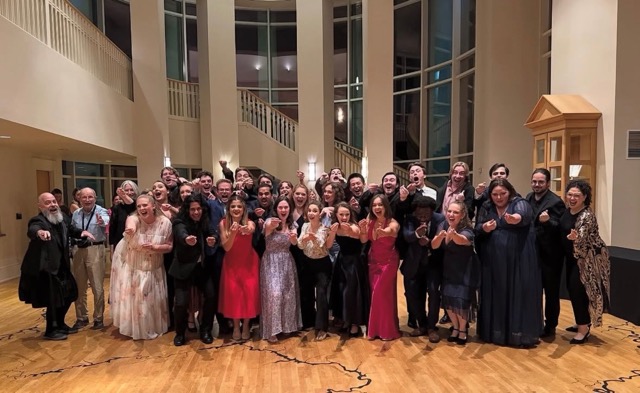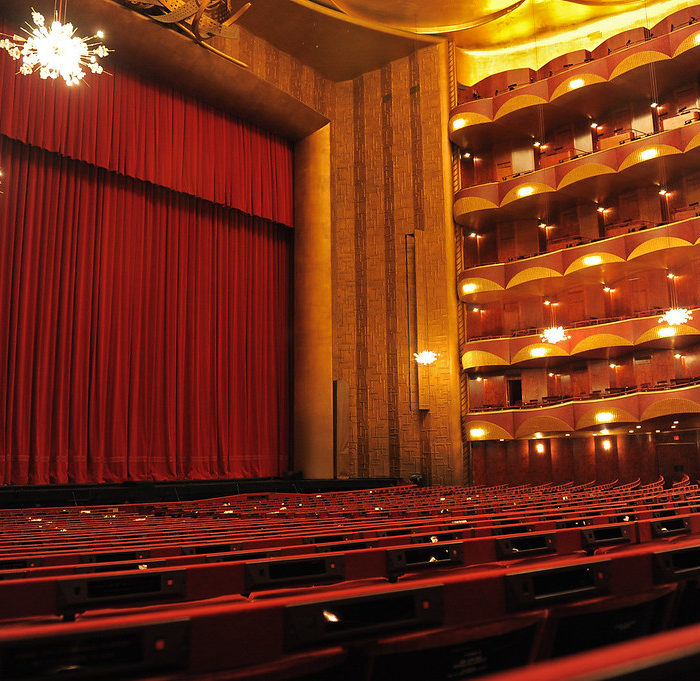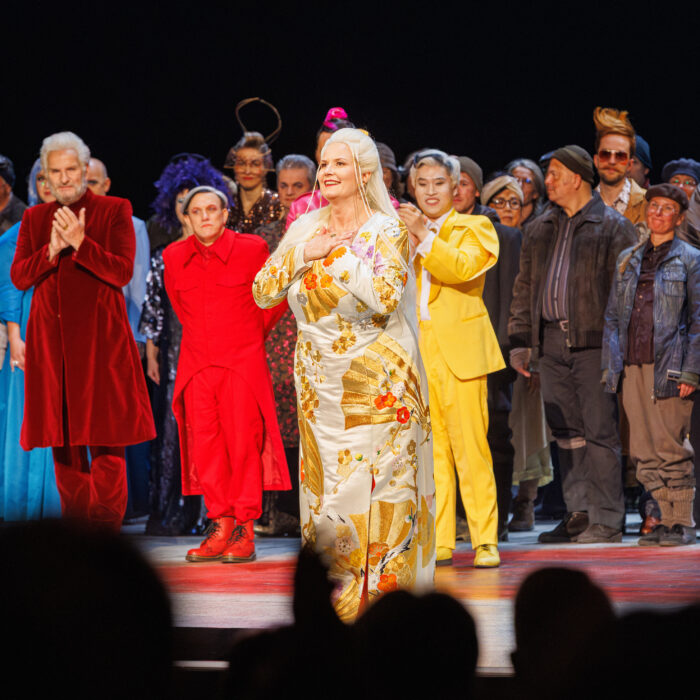
Opera in Appalachia – How Brevard Music Center Brought Opera to the Mountains
By Afton Markay(Photo credit: Chuck Gilmore)
Southern Appalachia is typically acknowledged as the heart of traditional American folk music, from old-time string bands to bluegrass, and haunting ballads, but there are more connections to opera and classical singing than one might realize. Pioneers like Cecil Sharp, Maud Karpeles, and John Jacob Niles collected folk songs throughout southern Appalachia, such as “The Lover’s Farewell” and “I Wonder As I Wander,” that are now standards in the classical English repertoire. This region has served as inspiration for many choral works, and Jennifer Higdon’s opera,“Cold Mountain” is even set here. But, at the heart of North Carolina’s Appalachian Mountains lies the Brevard Music Center, where for the past 60 years opera has echoed throughout these mountains.
Where it All Started
In 1936, conductor James Pfohl opened a boys-only summer music camp in Davidson, NC. Following its initial success, the camp became coeducational and moved to its present location in Brevard in 1944. Two years later, the inaugural Brevard Music Festival was held. The 1960s saw significant growth with the opening of the iconic 1,800 seat, open-air, Whittington-Pfohl Auditorium and opera becoming a staple in the Festival’s programming.

(Photo: BMC)
During this era, conductor Henry Janiec took over as Artistic Director, succeeding Pfohl. Upon Janiec’s retirement in 1996, the Festival’s opera company was renamed in his honor. From here, Brevard alumnus David Effron took the reins, and today, Keith Lockhart, also an alumnus, serves as Artistic Director.
Over the years, the Festival has hosted opera greats such as Frederica Von Stade, Renée Flemming, Beverly Sills, Angela Brown, and Samuel Ramey, and has produced over 100 operas, including world premieres. The Festival’s opera and classical voice programming has now expanded into three divisions to include opera and choral courses for high schoolers.
This year, the Janiec Opera Company consisted of Adam Bell, Alexandra Kzeski, Andrew Hebert, Ashley Manocchi, Bailey Bower, Benjamin Chen, Brian Linares, Callie Iliff, Charles McGregor, Chris Leimbruger, Claire Griffin, Christopher Leimgruber, Deshawn Stevens, Elizabeth Neumeyer, Hunter Warnick, Ian Pathak, Jordan Twadell, Laura Looper, Madelyn Salazar, Morgan Small, Nicole Dipasquale, Robert Kleinertz, Rudy Polk, Sarah McHan, Seth Tack, Staley Clark, Stefan Vikingur, Stephen Riesen, and Aoife Schenz. Under the guidance of alumnus and Director of Opera, Dean Anthony, they presented fully staged productions of “L’Elisir d’Amore,” Viardot’s “Cinderella,” and “The Magic Flute,” along with “An Evening of Operetta.” This was on top of daily coaching, classes in style, diction, acting, and movement, along with professional practices.
For nearly 90 years, the Brevard Music Center has fostered classical music in Appalachia. This season celebrated that legacy with opera at the forefront, featuring resident composers Jennifer Higdon, Caroline Shaw, and Mason Bates. The Festival has clearly stood the test of time, and its impact is heard most directly through the students and faculty.
In Their Own Words
Anthony started off our interview by saying, “It’s not just about the summer, it’s about making sure they have a path forward.” Before the students arrive, their auditions are carefully assessed for certain personality traits as well as singing. Anthony explains, “I want to hear someone who’s just hungry, someone who loves the craft, and has the passion for it. That tells me more than a perfect audition. When I ask them questions, I can hear it in their answers – whether they’re putting on something formal, or whether they’re really in it because they love it. That’s what I’m looking for.”
Curating a group of like-minded artists is just the first step in creating an environment that will make a positive and lasting impact. So how does that actually take shape in the Janiec Opera Company? Anthony says, “Cultivating that family really starts with the idea of no judgment. I fight for people to take risks. Make a huge mistake, make it big, we’ll celebrate it, and then we’ll fix it.”
Soprano Bailey Bower shared how from the very first day she could feel this sense of openness, ironically in an activity called “Death by Aria.” She explained, “This is where everybody gets up and sings an aria, the very first day, first thing in the morning. It was terrifying, because nobody knows each other, but after we did that, Dean made a comment, he said, ‘this is where you are right now, this is where you’re meant to be, and from here on out it’s just progressing forward,’ and I really loved that, it really set the tone for the summer.”
Second year, soprano Alexandra Kzeski, added, “I think because Dean cares so much about how we progress and how we grow. It’s nice that he creates a group that fosters that kind of environment. It feels so supportive when you make mistakes because you know they can be made without judgment and it’s all just growth and assessment. So, that’s one of the really special things about this program.”
The singers respectfully shared insight into the morning movement class. Each morning, the company members gather for a session that they described as “sacred.” This practice offers the singers to focus on their body awareness, muscle engagement, mindfulness, and practice non-judgement. Baritone Seth Tack shared, “I think to newcomers Dean’s methods can seem a little new-agey and abstract but what we’re learning is actually clear stagecraft. The product is really clear and applicable. You can feel a difference; it feels more comfortable to take corrections which is a new thing for me, but also you see how it affects your peers’ functioning and wellbeing on stage.”

(Photo: Alexandra Kzeski)
This holistic approach ties into the core values the company holds. Everything used in the productions is hand-made on site, from wigs and costumes, to sets by “people who care deeply about the craft.” Because of this, “the singers are expected to thank every single person who contributes. That’s how you become a better colleague and, most importantly, a decent human being. Opera isn’t just about what happens on stage – it’s about the community that makes it possible,” says Anthony.
“You May Leave Brevard, but Brevard Never Leaves You”
From opening its doors to girls in the early 1940s, to becoming one of the first programs in the Southern U.S. to welcome international students, to now emphasizing the work of women and 2SLGBTQIA+ artists, the Brevard Music Festival has established itself as a place of inclusivity and musical innovation.
The 1965 edition of “Overture,” the Festival’s annual journal, beautifully reads, “Rarely have summer concert-goers in the South had such an opportunity as will be afforded them by the creation of this new opera company at the Brevard Music Center. It is a proud addition and one of the greatest highlights of our 1965 season.” Now, 60 years later, thousands have experienced opera thanks to the Brevard Music Festival, and countless others have learned invaluable skills for succeeding in the opera industry.
For centuries, the music of Appalachia and opera have transcended borders, demonstrating the impact music can have. Combined with the passion and dedication of Brevard alumni, this serves as a reminder that opera is, and will continue to be, a conduit for connection and creativity for years to come.
Read Related Stories
Categories
Special Features

